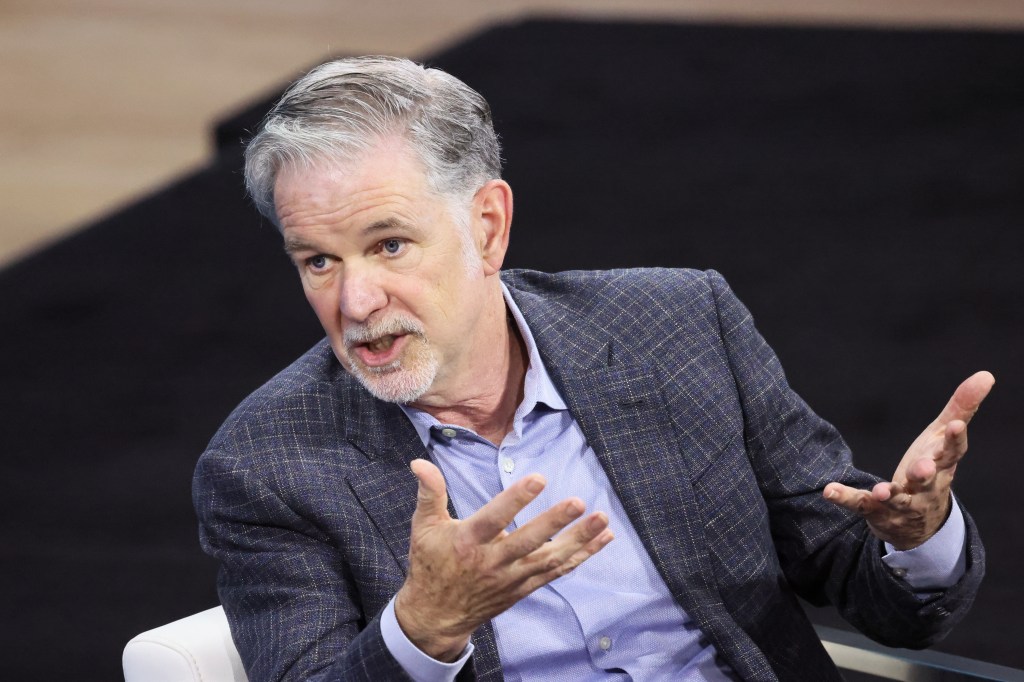Netflix co-founder Reed Hastings stepped down as co-CEO after 25 years at the company’s helm, Netflix announced Thursday in its fourth-quarter earnings report, after the streaming service added over 7 million subscribers in the last three months of 2022, surpassing expectations as it reported slightly increased revenue after a difficult first half of the year for the content giant.
Former COO Greg Peters will replace Hastings as co-CEO of Netflix, joining the company’s existing co-CEO Ted Sarandos. At the same time, Hastings—Netflix’s cofounder—will remain the brand’s executive chairman.
Hastings, 62, tweeted that he will stay as executive chairman for “many years to come,” and he’s “so confident” in Peters and Sarandos’ leadership. “Twice the heart, double the ability to please members & accelerate growth,” Hastings wrote. He said he plans to spend “more time on philanthropy” and focus on Netflix’s stock.
The streaming giant reported 75 million subscribers, an increase of 7.66 million from the third quarter—more than the 4.5 million it expected to add.
Netflix reported revenue of US$7.85 billion in the fourth quarter, roughly 1.2% more than the $7.7 billion reported in the same period last year and falling in line with analyst forecasts.
Net income, meanwhile, went down from last year to $55 million, or US$0.12 per share, compared to US$607 million one year ago and below-average analyst expectations of US$0.45 per share.
Netflix shares increased nearly 5% in after-hours trading immediately after the announcement; shares have plunged 37% over the past year, far more than the tech-heavy Nasdaq’s 23% decline.

Hastings is worth an estimated US$3.3 billion, according to Forbes estimates. The 62-year-old owns about 2% of Netflix, which went public in 2002. Sarandos was promoted to co-CEO in 2020.
The earnings report marks the end of one of the rockiest years in Netflix’s history. In the first quarter, it reported subscriber losses for the first time in a decade, which continued into the second quarter. The streaming giant began adding subscribers again in the third quarter, however, reversing its subscriber losses in the first half of the year.
The company blamed the losses in part on households that share accounts and passwords and launched test programs in some countries to combat the issue. It’s been reported this program will roll out to the U.S. sometime this year.
Netflix also launched a cheaper, ad-supported tier in November to increase its subscriber base, though Digiday reported last month the company is falling behind on viewership expectations it promised to advertisers, and the Wall Street Journal reported data showing only 9% of new Netflix users were those who signed up for the ad-supported tier in its first month. Still, Netflix shows released in 2022 saw record viewership. Five of the top 10 most viewed English-language shows in their first month on Netflix were released last year.
Netflix password sharing crackdown set to begin
Netflix is poised to crack down on password sharing outside of households, the online streaming giant has confirmed.
Announcing its Q4 results, Netflix said it would roll out a paid option for those who want to share their accounts. “Today’s widespread account sharing (100M+ households) undermines our long-term ability to invest in and improve Netflix, as well as build our business,” Netflix said in a shareholder letter.
While a date still isn’t confirmed, Netflix specified the password-sharing measures would come in later in the first quarter of this year, which would suggest you can expect them to be in place by the end of March.
There is no news on how much the password-sharing Netflix option will cost, but it is offered in some markets for US$3, so it will be cheaper than buying two accounts.
This article was first published on forbes.com